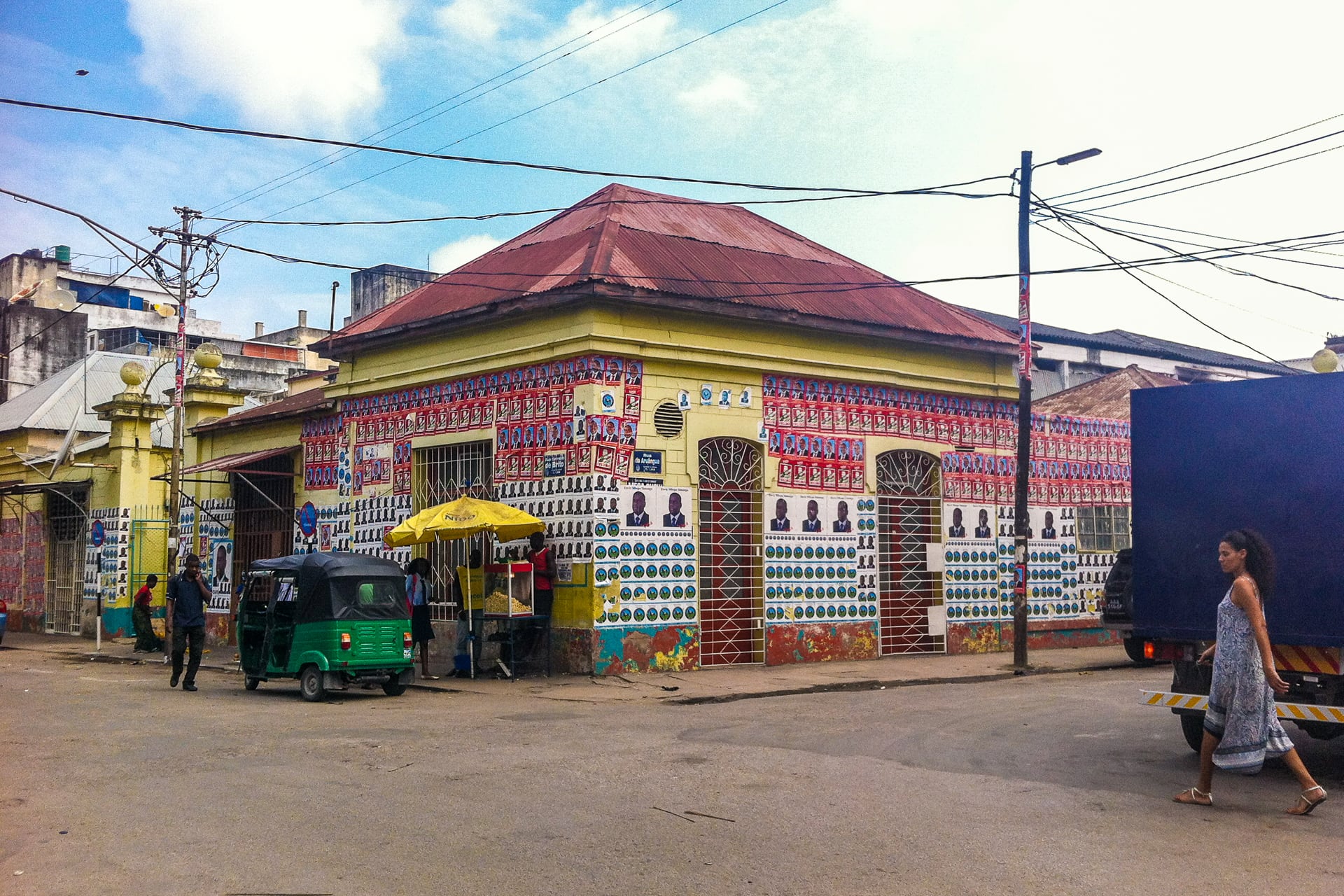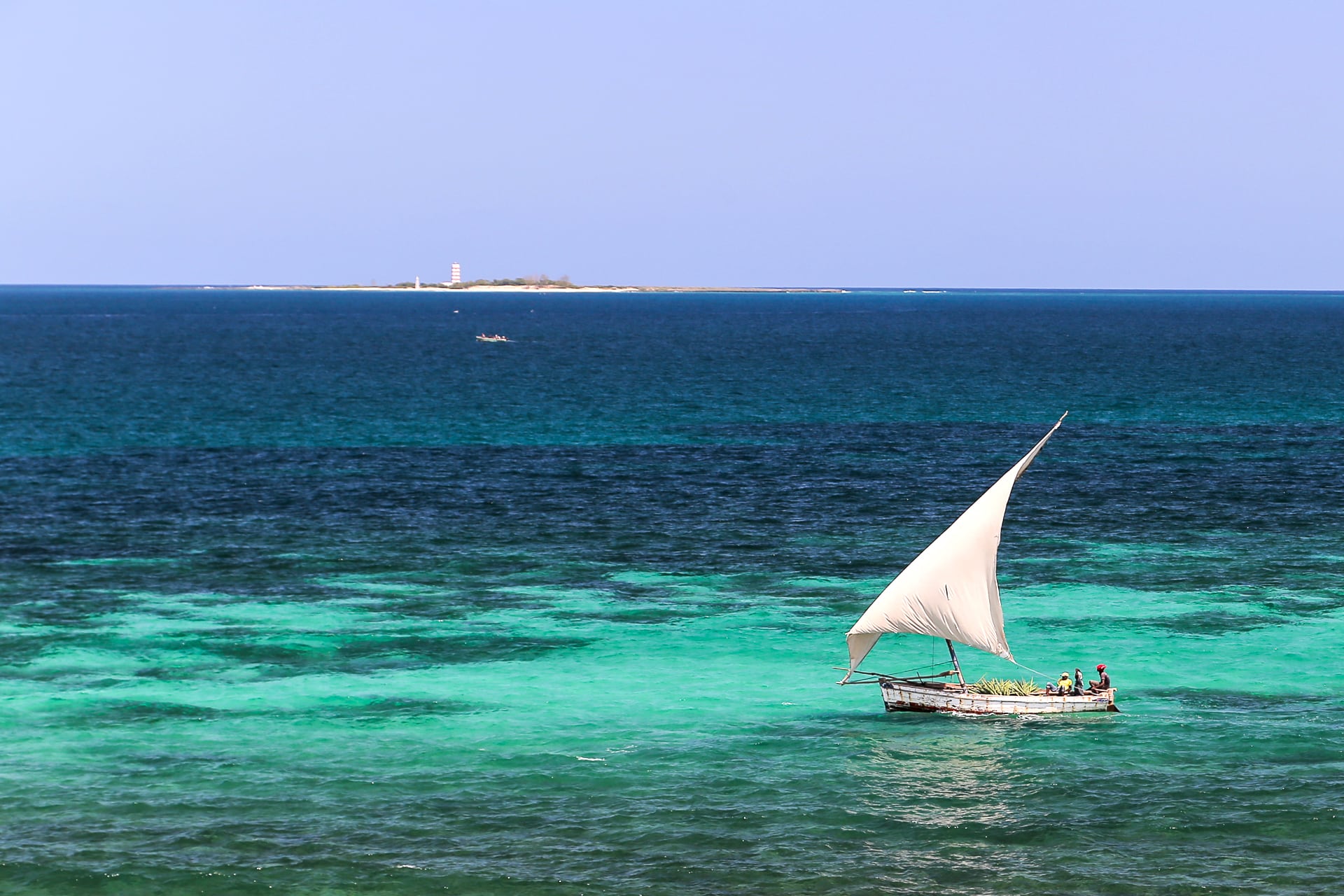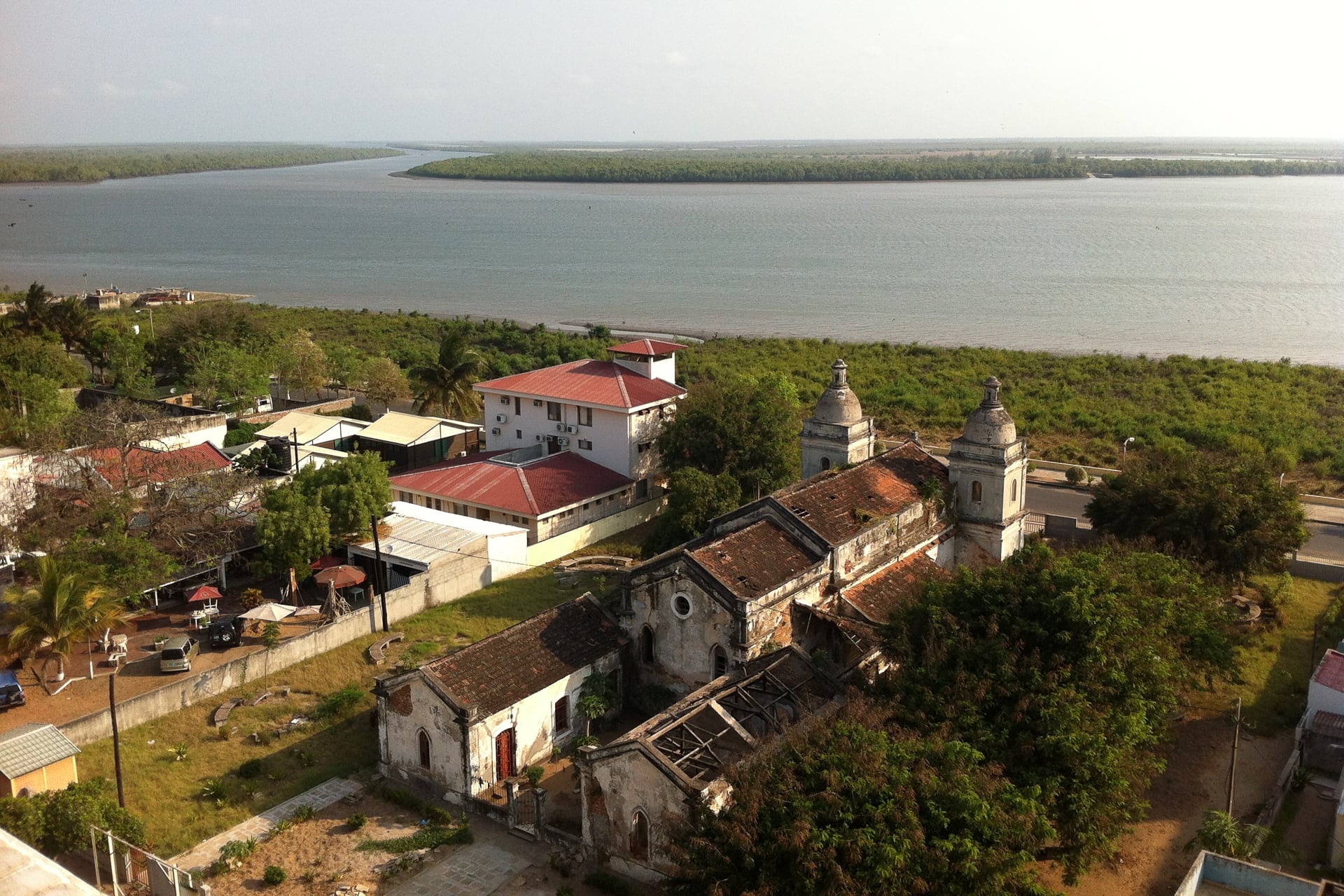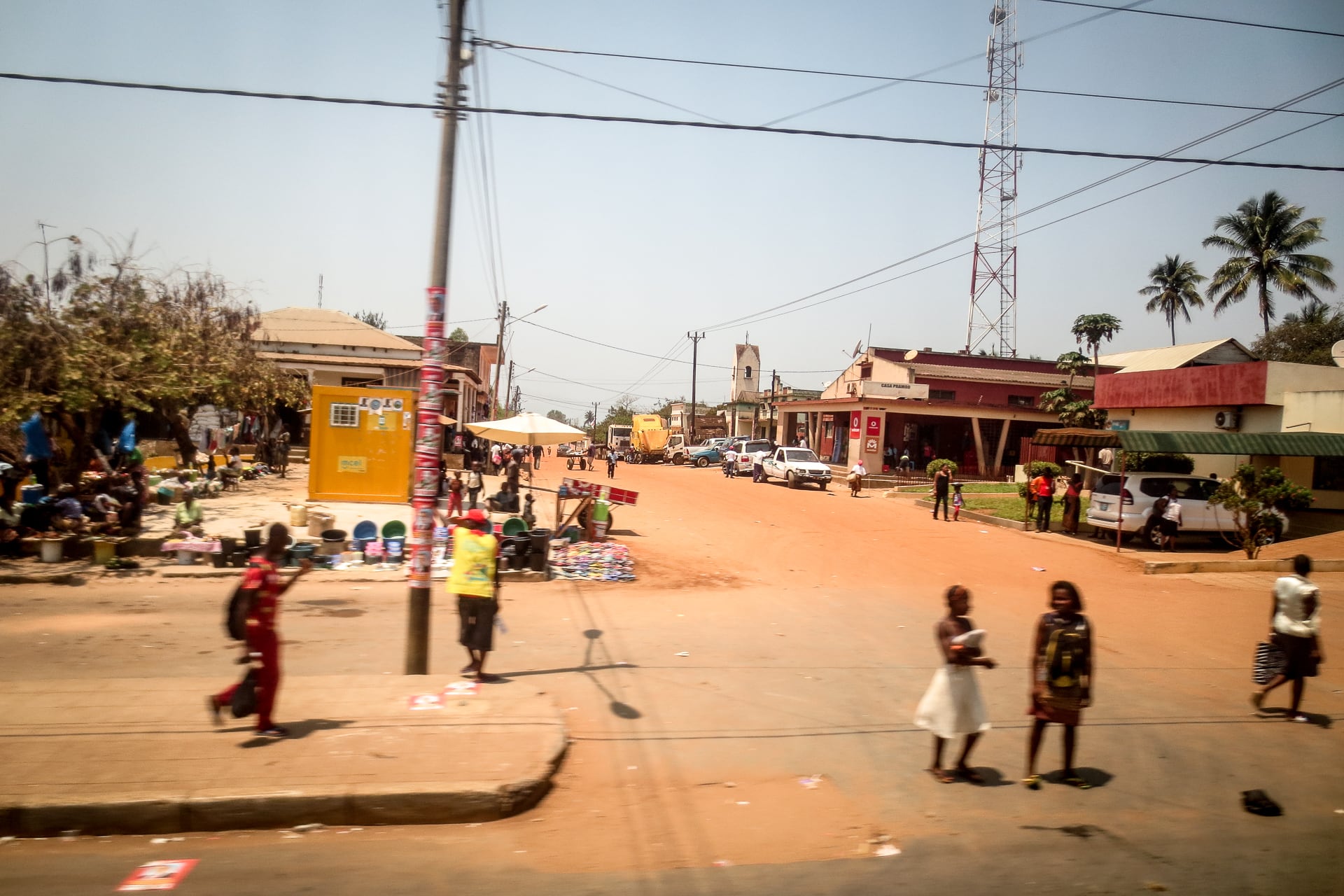
Beira has a bit of a reputation: Faded glory, prostitutes, crime. It may come as no surprise then that, when people decide to visit Mozambique, Beira rarely makes the itinerary.
And why should it? Most visitors’ time is precious, Mozambique has some truly amazing stretches of coastline, and Beira is far from nearly everywhere else. Even South Africans and Tanzanians have to make a very concerted effort to get to Beira. The city is about halfway down the length of Mozambique. There’s a decent road connecting the city to Harare, Zimbabwe’s capital city, but driving from anywhere else takes much more effort: 18 hours from Maputo in the far south, 24 hours from Pemba in the north. And who but business people or family members of residents would pay for a ticket to Beira? I’d imagine Beira is one of those cities that books many more outbound than inbound flights, if you know what I’m sayin’…
Yet, there’s definitely an intrigue, a mystique to this place. I think we enjoyed our time in Beira so much because it felt a world apart. It’s a city that has a strange energy to it. The buildings, no matter their vintage, lay rotting and in desperate need of a paint job (or at least a good power washing) — but at the same time, it’s the type of place that’s so dilapidated, so time worn, that a power washing would most certainly upset the structural integrity of the vast majority of buildings in the city center, so even a good deep clean is probably out of the question.
But life bustles on. Businessmen and women in suits hurry about the central plazas, taxis and chapas fill the streets, along with women selling their produce and men hawking their wares. It’s a place, for all intents and purposes in the 21st century, that really has no business being this busy — but it is.
For all these reasons and more, Beira is an adventure in itself. But this time around, the real adventure was just getting to Beira…alive!

This is a photo of the Rio Save. From the looks of it, there’s really nothing to differentiate the Save from any other river in the region. Politically speaking, however, this river is incredibly significant.
For one, it forms the border between Inhambane and Sofala Provinces. I hadn’t crossed the river until I had lived in Mozambique for over two years. It’s the bridge between the politically powerful South and the resource-rich Central and Northern regions. It also marked an important division during the Civil War, between the FRELIMO-dominated south and the RENAMO guerrilla strongholds. South of this river, the predominate religion is Roman Catholicism. North, Islam.
More importantly for us, however, is that for the last year, Mozambique’s slide back into violence and insecurity centered on this stretch of lonely highway, a strategic corridor linking north and south, because it’s the ONLY road linking the north to the south. It was between the Save bridge and the town of Machungue that public buses, not much different from the one we found ourselves on, were being ambushed and attached by RENAMO rebel fighters. Not since the Peace Accord effectively ending the war was signed over two decades ago had Mozambique seen anything close to this degree of politically-motivated violence. For much of the previous year, military convoys were escorting traffic up and down this 60-mile stretch, which didn’t seem to do much but provoke more attacks. There was a period mid-year when it seemed you couldn’t go a day without reading about another attack on one of these convoys. And we were planning to visit!
We had already bought our tickets into Cape Town and out of Entebbe by this point and were grappling with how to make the trip still work on a budget without being able to travel through central or northern Mozambique, a ginormous chunk of land by all accounts. The other complicating factor was, that no matter which way we sliced it, we were going to be heading up through Mozambique right around the time of the General Elections. Every source on the subject agreed that if there was going to be a time of heightened or renewed violence, the elections would be it. Great.
Yet, there was simply no way we were not going to go to Mozambique. Mozambique was the impetus for the entire Africa trip and we just couldn’t fathom traveling all the way across the globe, to be within miles of the place I called home for two years, and not even go. So we worked on hashing out a Plan B, which was by no means elegant, but allowed us to visit Southern Mozambique (where I had lived and spent the vast majority of my time) while still preserving the overland aspect of our trip, which at the time was very important to us. We would travel as far as Vilanculos and then make a determination. If the Save-Machungue route was too hot, we’d catch a bus back to Maputo and head up through Zimbabwe and into Zambia, cutting back over into Tanzania. Unbelievably, there are no good overland options heading west out of the country in the 500 miles between Beira and Maputo. You just have to backtrack and do it all over again. We knew it wouldn’t be ideal, but would allow us to see more of Southern Africa than anticipated. And the bus fares would still fall short of the cost of a plane ticket from Vilanculos to Dar (via Maputo)…they ain’t cheap.

• • •
And then, one day shortly before we left Belize, both sides signed an agreement, the violence stopped and that was that.
Though there wasn’t even a hint of violence, we proceeded cautiously with Mozambique trip planning over the next several weeks. Despite the renewed peace, we were due to cross the Rio Save just days before the election and I still felt a bit uneasy about it. I knew that if anyone was going to break the agreement, if things were going to turn sour, it was going to be in the immediate aftermath of the elections on October 15th. So, it became an obsession of mine to cross the Save and get north of Machungue, and even north of Beira, the stronghold of the third-party RENAMO splinter group, the MDM, and north, north, north by the time the votes were tallied. Quelimane, the capital of Zambezia Province felt like as good a geographic goal as any. The main repercussion this had for us was not being able to return to Morrumbene, my Peace Corps site, for an extended length of time. I had made my peace with Morrumbene, so it really ended up being a non-issue. By the end of our time in Southern Mozambique, we had seen everything we really wanted to see and more.

We crossed the Save without incident. The stretch of highway that had been making headlines for months now appeared so incredibly innocuous and mundane it was impossible to imagine the carnage and violence that had happened only recently. I’m not sure if I expected to see burned out buses or what, but it looked like any other stretch that we passed or would pass that day — both comforting and eerily unsettling at the same time.
We arrived in Beira after dark…there was no way around it. We were so close to our hotel, just blocks away, and really didn’t want to have to pay for a taxi. I mean, so close. We fought off the gaggle of taxi drivers vying for our business and set out in the direction of our hotel. We agreed we’d take the main avenue, which was still teeming with life and well-lit at 8pm, but we had to walk about a hundred yards down a dark road to get there first. No problem…until we started passing the prostitutes. One prostitute, two prostitutes, red prostitute, blue prostitute… So many women of the night! And then the pimps started appearing. Yep, that dude is definitely a pimp, I thought to myself, and that one and that one…and that one too. I’m not sure Lori realized what was going on at the time, but I turned us around…more conspicuously than I would have liked…and saw the taxi drivers, smug and waiting. I looked back at the working ladies, then again at the cabbies. Darn you pride. Darn you. Then, out of the corner of my eye, I spotted our salvation. Tuk-tuk!
Our man asked, “Where to?”
“Hotel Savoy! You know it?” I asked (this of course is all in Portuguese).
The tuk-tuk driver replied with a bemused chuckle and nod, which I thought was a bit strange. We quickly agreed on a fair price, loaded up and zipped off to our digs.
The night man was very friendly and showed us to our room. There was something about the place that just grabbed me instantly, a weird sort of decaying charm–“if only these walls could talk” sort of place. Our Bradt guide described the place beautifully:
“Unlikely to pose too many difficulties in a ‘spot the difference’ contest with its London namesake, this improbably timeworn hotel has what might diplomatically be called an excess of character, but it’s a useful option for budget travellers taking early morning chapas.”
“Improbably timeworn…” “An excess of character…” I mean, who could say no to that? At $26/night we sure couldn’t.

After a long, ten-hour bus ride, we were happy to have reached our destination for the next few days…but were terribly hungry. The night man directed us to a couple of restaurants nearby, neither of which looked that appealing until we laid eyes on the Chinese restaurant just around the corner, which was delicious.
We headed back to the Savoy and decided to get cleaned up. It was a shared-bathroom sort of place and so Lori went off to the women’s room and I went off to mine, passing an older man and younger woman coming out of a neighboring room and getting ready to leave…no luggage, 10pm at night, you know, the usual.
I had a gloriously hot shower and returned a bit later to Lori who had a perplexed look on her face. She told me she saw the night man checking-in a couple near the women’s room…no bags, and they looked kind of uncomfortable around each other. Hmm, I thought. Then she tells me it’s really hot in our room. I agree. It’s the first room we’ve had that doesn’t even have a fan. I proceed with trying to open up some of the windows to get some air flowing through the room. Lori gets up and leaves, all of a sudden, returning a few minutes later with an electric fan.
Stunned, I ask, “Where’d you get that!?”
“I took it from the room next-door.”
“You just went into somebody’s room and took their fan?”
“No…well kind of. The couple left a while ago, with the key in the door and the door wide open and I saw the fan on my way back from the bathroom. So I went in and took it. Had to step over a big pile of sheets to get to it. Kind of gross, but we’ll be able to sleep now.”
And that, kids, was the night we stayed at a brothel in downtown Beira and your mom went into a prostitute’s room and stole their floor fan. Sweet dreams!
• • •
But seriously, if you do find yourself in Beira on a budget, I would definitely recommend Hotel Savoy. It was clean, safe, comfortable, centrally located and everyone was so friendly. They also have a pretty nice out door restaurant. You just might run into a few couples without luggage checking out at 10pm and you might have to steal your fan from a prostitute (or ask downstairs, I’m sure they could accommodate you…). Other than that, good, solid shoestring place.

I visited Beira about eight years ago on my way to Rio Savane and then on to Tete. It’s one place that hasn’t changed much and probably won’t in the foreseeable future. It’s just that kind of place. But it’s worth a poke around town. The Bradt Mozambique guide actually has a nice self-guided Beira walking tour. It’s pretty interesting and kept our attention for an entire day, taking us through all the major parts of the city.
There was one Beira site that was conspicuously absent in the guidebook, however — the world-famous ship graveyard. I had tried to find it (unsuccessfully) my first time in Beira, and was intent on finding it again. I had shown Lori photos online over the years. It’s a place that defies imagination. An enormous wasteland of varying vintages of voluminous vessels (for you alliteration-lovers out there). There’s no other place quite like it on Earth…so I’m told.
So we set out to find the world famous ship graveyard. I recognized one of the old ships from a photo at the Beira port and asked the security guards if this was where the old ships were. He said yes, gave us a couple of passes to wear and we proceeded to stroll about the third largest port facility in Mozambique. Try that in the States! It was interesting enough, but not what I expected. After walking around for a while, we asked one of the dock hands where all the old ships went. He told us that it had all been cleaned up and they were no more. Wow! I thought, in eight years. I saw Beira in a new light…a city on the move, a city that make thousands of tons of wreckage disappear in just a matter of years and replace it with a bustling port facility. But something wasn’t quite right. The photos I had seen weren’t all that old.
Days later, after we had moved on from Beira, I was online and decided to do some research. Apparently, the graveyard does exist, but we were looking in the wrong place! It’s much farther south along the shore than the port. Yet, no one seemed to know what we were talking about. Well, I guess it gives us a reason to go back to Beira some day…sort of.

At least the Macuti wreck was still in the same place (more or less) as I remember it. After our walking tour, we ventured down to Macuti beach, where the iconic lighthouse (and old rusting hulk of a ship’s hull in front of the lighthouse) overlooks the sea.



We had about three beers or so at the restaurant adjacent to the Macuti where I had had a beer in Biera the last time I was there and had a nice little time watching the big container ships pass.
By this point, we had seen everything we wanted to see…except for one thing: The infamous Grande Hotel.
The Grande Hotel is not some place that tourists go…ever. It’s not even some place that intrepid travelers go. It’s not even a place that Mozambicans go, unless you’re one of 3,000 or so displaced squatters that call the Hotel home.
It’s a mammoth hotel that was built as a luxurious casino and resort in the 1960s, a playground for the rich. Due to a number of reasons, however, it was only open for a handful of years before going bankrupt and beginning its slide into decline. Mozambique’s independence in ’75 sealed its fate and the monstrous complex sat abandoned…until the Civil War broke out and displaced persons, whose homes and villages had been destroyed, began to flock to the abandoned building by the hundreds.
There is no electricity or running water in the sprawling structure. The old swimming pool is the main source of water for the 3,000 inhabitants (as well as the main sewage collection area). There are a variety of gangs that control various wings of the Hotel. The very poorest of Beira’s poor live there in extremely substandard conditions. It is not a place you visit…day or night.
• • •
…unless you’ve had three beers, are leaving early the next morning and are dead set on seeing the place.
So after dinner on the waterfront, we strolled the promenade. Let’s just walk a little and if it gets to hairy we’ll turn around, we both agreed.
So we strolled and strolled, as the night got darker and darker and the streetlights flickered on and off. And then, we came upon it…we could make it out in the distance, like a giant ghost. Not a single light on…not even a discernible candle. It was pitch dark now and we had to strain our eyes to see it across a field in the pitch black night. It was just massive. We could make out the pool and the various wings. For some reason we kept going.
I’m going to stop and say right now that this was probably one of the dumbest things we’ve done in a long time, but something compelled us to continue, not just the beer (which by that time had mostly worn off), but something I cannot say for certain.
We approached the monster of a complex and rounded the corner, where the front of the once five-star hotel abuts the street. There were a handful of market stalls lining the street, abutting the reception drive-through, where Europe and Africa’s most affluent followed bell boys into the grand foyer, the lap of luxury for the time. No bell boys greeted us this evening, only darkness. The darkness is what strikes you. And the voices. The echoes of countless voices from the mass of darkness. We walked faster, trying to take it all in as we went by.
We had made it. We had seen the Grande Hotel…at night…and survived. Now, we just needed to get back to Hotel Savoy. I had looked at a map prior to our outing and noticed a busy avenue leading north from the hotel. We just had to stay on that road and we’d be fine. There was another road that hugged the coast a little bit that I was intent on avoiding as it appeared to go through nothing but a big open field.
So we walked north…or so we thought. We walked through a lively neighborhood, and then the neighborhood suddenly ran out, and we were on a dirt road in an open field. Not good. We walked faster.
After about five minutes, a car approached us, then stopped, out in the middle of nowhere, in pitch darkness. The engine shut off, with the headlights glaring. Keep going, or turn around? If we kept going, we’d have to pass the car. We stopped, turned around and walked back…towards the Grande Hotel. Then we heard a voice shouting from the car, then, moments later, another voice shouting back from the dark cement wall next to the car. He came to visit his friend, of course. His friend was just hanging out in a pitch-black open field behind a cement fence, of course. We turned back around and sped-walked past the car.
About 15 minutes later, we made it back to the main part of town, well lit, with a good number of people strolling about, enjoying the cool night. About five minutes later, we were back at the Hotel Savoy, our adoptive brothel. Our relief was palpable, and we were exhausted.
Tomorrow, another 2:30am wake-up!





Have you considered writing a mystery novel?